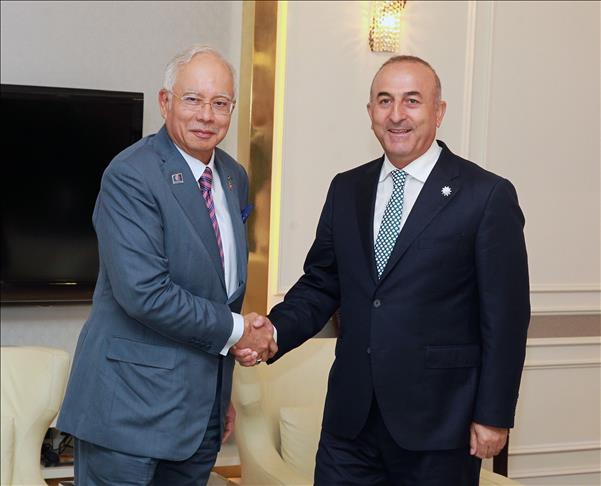
By Selen Tonkus and P Prem Kumar
KUALA LUMPUR
Malaysia's prime minister has told ministers at the opening of this year's Association of Southeast Asian Nations (ASEAN) meet to be vocal and confident in the future, claiming that the pact is on course to become the world's fourth largest economy by 2050.
Najib Razak predicted greater ASEAN integration and said that the creation of an ASEAN economic community could drive annual regional gross domestic product of 6 percent to 8 percent.
"If ASEAN is sometimes underestimated, we must be careful that we are not guilty of that ourselves. We believe it is timely for ASEAN's united voice to be heard more frequently at multilateral fora," Razak said.
Among those at ASEAN's 48th Foreign Ministerial Meeting were Turkey's Foreign Minister Mevlut Cavusoglu, who told reporters that during a meeting with Razak they had discussed boosting trade volume between Turkey and Malaysia, increasing cooperation on defense, attempts to tackle Daesh and how to prevent foreign fighters from joining the group.
Asked the importance of ASEAN, Cavusoglu said he hoped Turkey would become a dialogue partner in the near future.
"Turkey will be very helpful to this organization. We have increased our relations to a strategic level with many of the member countries," he added.
"However, since there is a moratorium to join ASEAN, we have not been able to become a dialogue partner. Of course it is up to ASEAN to decide, but we hope ASEAN can consider our application," he said.
The foreign minister was referring to the moratorium on new dialogue partner admissions up to the end of 2015.
Cavusoglu underlined that Turkey had been cooperating with many regional organizations on global issues -- such as the fight against "terrorism" -- and said that it could cooperate with ASEAN on issues such as the rise of Islamophobia and racial discrimination.
He added that that other issues that came up for discussion during the meeting were the Malaysia-Turkey Free Trade Agreement (MTFTA) -- sealed Aug. 1 -- and Malaysia attempting to solve the problems faced by Rohingya refugees fleeing Myanmar.
Established in 1967 in Bangkok, ASEAN consists of Brunei, Cambodia, Indonesia, Malaysia, Myanmar, Philippines, Singapore, Thailand, Vietnam and Laos -- the only member country in which Turkey does not have an embassy.
"We will open an embassy in Laos soon," Cavusoglu affirmed.
Razak told ministers during Tuesday's opening speech that Malaysia, as this year's chair, has prioritized enhancing ASEAN's role as a global player.
"There is no reason why ASEAN should not take a more active role in the international community," he said.
Malaysian Minister of Foreign Affairs Anifah Aman added that ASEAN's growing strength signaled to the rest of the world how much the community has achieved.
"Our ASEAN Community makes us stronger and more economically secured. More open to trade and outside investment. Less vulnerable to global financial volatility," he said.
He said that investment in the Southeast Asian grouping reached $136.2 billion last year, or 15.7 percent year-on-year growth, while last year's trade amounted to $2.53 trillion with leaders expecting an even stronger growth rate of 4.9 percent this year.
Cavusoglu was among foreign ministers from 27 countries that comprise the ASEAN Regional Forum, along with 10 ASEAN countries, and 10 ASEAN Dialogue Partners.
Speaking later in the day at a joint press conference with Malaysian Minister of International Trade and Industry Mostapa Mohamed, Cavusoglu said he hopes the MTFTA which comes into effect Aug. 1 will tackle the foreign trade imbalance between the two countries.
Trade volume between Malaysia and Turkey stood at $969 million in 2014, with Turkey importing $752 million in goods from Malaysia, with just $217 million going the other way.
Mohamed said he hoped the agreement would provide a platform to deepen and intensify trade and economic links on a long-term basis between the two.
"Turkey, with its population, holds vast market potential for the Malaysian business community," he added.
During his three-day trip to Malaysia, Cavusoglu is scheduled to hold bilateral talks with counterparts and deliver a speech at the International Islamic University of Malaysia and be received by the premier.
According to Turkey's foreign ministry website, institutional relations with the Southeast Asian grouping were initially established in 2010 when Turkey became a signatory of the ASEAN Treaty of Amity and Cooperation in Southeast Asia "and thus the foundation of sectorial cooperation was laid down".
The ministry says Turkey is aiming to develop bilateral relations with countries in the Asia-Pacific region -- "whose importance in international politics, in global economic and commercial terms is increasing" -- as well as improving institutional cooperation with the regional cooperation organizations.
Turkey has been invited to the foreign ministerial meeting as the guest of ASEAN Chairs since 2013.
*Anadolu Agency correspondent Satuk Bugra Kutlugun contributed to this story from Ankara
Anadolu Agency website contains only a portion of the news stories offered to subscribers in the AA News Broadcasting System (HAS), and in summarized form. Please contact us for subscription options.

